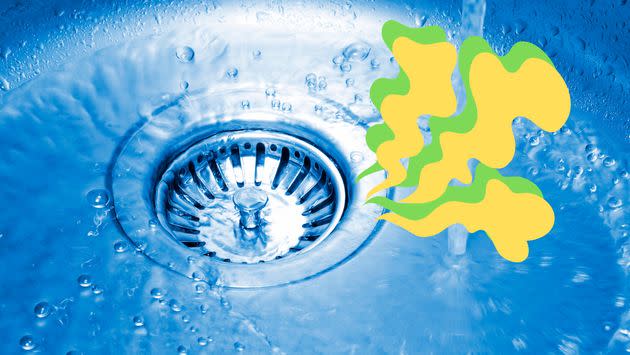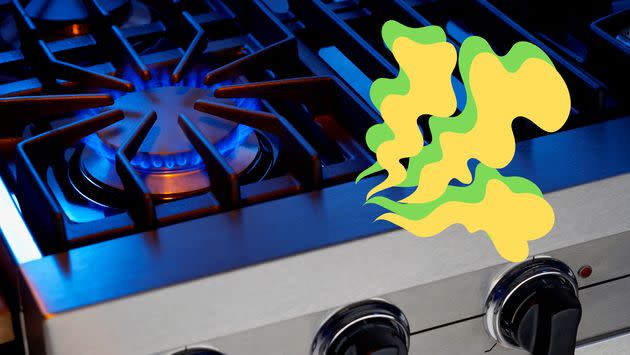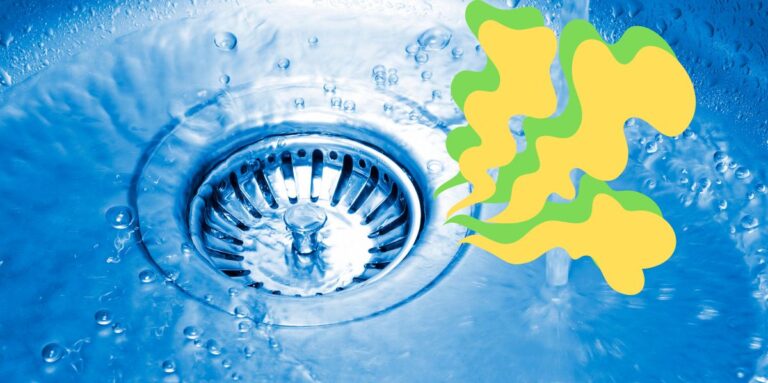
The kitchen is a naturally smelly place. You're likely to smell something while you're cooking, getting ready to empty the fridge, or getting ready to clean up after making dinner. something In your kitchen.
With all this in mind, it's important to be aware of what odors should be of concern.
We spoke to experts to find out what smells might indicate your food is inedible, what smells might signal your home's safety is at risk, and what smells might suggest it's time for an appliance upgrade — plus, we got tips on how to get rid of them.
Rule #1: Not all cheeses have smells.
When dealing with leftovers, or any fresh produce or meat products, there's one most important rule: if it smells bad, throw it out. But when it comes to naturally smelly foods like cheese, the guidelines aren't so simple.
According to chef Kevin Ashton, culinary advisor for Restaurantji, there are three ways to tell if cheese has gone bad: unusual mold growth, a change in color, or a strong odor. He says identifying a bad odor is the best way to determine if cheese is safe to eat.
“Mild cheeses like American or Jack that give off a strong odor like Limburger or blue cheeses should be tossed,” Ashton explains. “Cheeses that have a naturally strong odor like Camembert will give off a relatively strong ammonia odor as they spoil.”
Overall, if you're used to the smell of a particular cheese, and the cheese you have smells “like what you're used to, but more concentrated,” Ashton says you should avoid eating it. But why exactly? Well…
“Spoiled cheese can harbor a wide variety of food poisoning bacteria, each of which can cause specific illnesses,” Ashton explained, naming Salmonella, E. coli, and Listeria, among others.
Each type of bacteria can cause different problems. For example, a Salmonella infection is “characterized by abdominal cramps, vomiting, diarrhea and fever,” he said. Those symptoms don't appear immediately, but rather take anywhere from six hours to six days to appear. Symptoms can last up to a week.
“E. coli can cause a variety of gastroenteritis, including hemolytic uremic syndrome (HUS),” Ashton added. Symptoms of these illnesses include bloody stools, stomach cramps, and vomiting. In extreme cases, it can lead to kidney failure. Ashton said young children and the elderly are most at risk when it comes to E. coli.
Meanwhile, pregnant women, newborns, and people with weakened immune systems are more susceptible to listeriosis, which is caused by the Listeria bacteria. “Symptoms include nausea, muscle pain, fever, and diarrhea,” says Ashton. All of which you want to avoid.
Rule #2: If you smell gas but there's no fire, call the authorities.
Energy company Con Edison says if you smell anything like rotten eggs or gas inside your home, especially if you have a gas stove or oven in the kitchen, you should leave the area and call authorities.
“The reason we need to act quickly is because of the possibility of a gas leak, which is always dangerous and potentially life-threatening,” said Hendrik Van de Poel, co-owner of Service Force Plumbing in Rockville, Maryland.
However, remember that if you smell gas but your stove burners are lit, it's not actually a reason to worry, especially if the smell seems to be fading.


Flames usually mean gas is burning, but an odor could indicate a gas leak in the system. ConEdison recommends turning off burners, ventilating the area, checking for leaks, and of course, calling a professional in any case.
There may be other reasons for the odor.
“Another, more harmless cause of a rotten egg smell is when your water heater's anode rod reacts with the water coming in from your city water or well water connection,” Van de Poel says, suggesting that in that case you replace the standard anode rod with an aluminum-zinc anode rod, which “doesn't have the same kind of reactivity.”
Rule #3: Check your kitchen drains.
Sometimes, unpleasant food-like smells don't come from your refrigerator, but from your kitchen drains, which is usually the result of a buildup of food particles, grease, and other debris..
“Food debris that accumulates in your kitchen drains can eventually cause a clog if not addressed promptly,” he explains. Justin Cornforthowner of Ace Plumbing in Anderson, South Carolina, says, “If your kitchen drain is smelling bad, it's time to give it a thorough cleaning. This is usually done with an enzyme drain cleaner, which is more effective and safer for your pipes than the harsh chemicals found in commercial cleaners.”
If you're looking to avoid using chemical or enzymatic cleaners in your kitchen, Cornforth explained that you can pour a mixture of vinegar and baking soda down your drain, let it sit for a few minutes or overnight, and then pour a pot of boiling water over it. This is a great preventative measure to try, as it will dissolve any small clogs or buildup that may have built up in the walls of your drain, so you might want to do this once a week.
That said, Cornforth warned that larger clogs may require more than just a vinegar and baking soda mixture.
If the smell doesn't go away, try removing the drain completely. Exchange Please replace it with a new one. “If the odor is caused by a severe clog or widespread buildup, cleaning agents won't help because they can't penetrate or dissolve the thick layers of accumulated debris and decaying organic matter,” Cornforth says. However, do not attempt to install it yourself, it is best to consult a professional before doing anything.
How to prevent bad kitchen odors before they happen.
The longer you allow unpleasant odors to persist, the harder it will be to find their source and eliminate them.
Cesar Fernandezculinary manager at Miele Great Britain, has some tips to keep in mind:
When dealing with food-related odors (such as after cooking or spoiled cheese), it is important to note that neutral odors may outweigh strong odors.
“So if you've finished cooking and want to get rid of the smell, simple actions like boiling water with lemon or white wine vinegar or making a fresh cup of coffee can also get rid of other smells,” he says.
Lemons are also useful for cleaning odorous kitchen appliances and products.
“If you have a minor accident while using the microwave where food splashes or leaves a strong smell behind, all you need to do is put half a lemon and a little water in a bowl and put it in the microwave on high for a few minutes,” Fernandez says, “Then leave the door closed for at least 10 minutes and your microwave will be back to smelling like new.”
But overall, Fernandez says the most surefire way to keep your kitchen smelly is to have a good range hood.
“It's really important that the ducting is adequate to maximize efficiency,” he said.
Clearly, it may be time to change some of your kitchen habits and tools.


